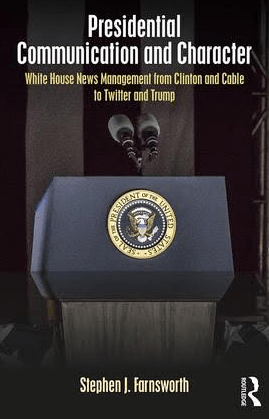Dr. Stephen Farnsworth on modern presidency
4 min read
Rachel Anne Manning
By RACHEL MANNING
Staff Writer
This spring, presidential scholar and University of Mary Washington professor Dr. Stephen Farnsworth published a book titled “Presidential Communication and Character: White House News Management from Clinton and Cable to Twitter and Trump.” The book marks his sixth on presidential communication so far. In the book, Farnsworth looks at the four presidents of the internet age: Bill Clinton, George W Bush, Barack Obama, and Donald Trump.
“I think that they key challenge for the modern presidency is how to present yourself to the public in a time when so many people are angry about politics. I think it’s difficult for presidents to be heard in a time where there’s lot of media, and critics of the presidents have as much of an opportunity to be heard as the presidents themselves,” said Farnsworth.
Farnsworth has used chapters from his book in the class he’s teaching this semester on the American Presidency and sends Word Doc versions of them to his students.
Senior political science major Caroline Trabucco has read several chapters of Farnsworth’s book as part of the class readings.
“I definitely think that Prof. Farnsworth is at the cutting edge of this particular area of scholarship,” Trabucco said. “After reading his work and being fortunate enough to study under him we can see how that field is changing.”
Throughout his research on presidential communication, Farnsworth has noticed a developing trend.
“Over the years that I’ve been writing about presidential communication I’ve really seen presidents struggle more and more with the changing media environment,” Farnsworth said. “The supporters and opponents of the president have more or less the same opportunity to be heard and they more or less are talking to the same camp so there’s not so much a dialogue as there are insults being directed at the other side. It makes a very difficult environment for a president who’s trying to govern. Whatever the policy may be, there’s going to be a lot of opposition to it.”
Senior political science major Chris Douglas, who is also a student in Farnsworth’s class, noticed this struggle to control public opinion after reading the assigned chapters of Farnsworth’s book and taking his class.
“It’s given me a better idea of how politician’s think. The ultimate goal of politicians is to be re-elected, so you have to understand that they’re not necessarily evil or bad- they’re just self-interested,” Douglas said.
Farnsworth mentioned that one of the difficult things about being a presidential scholar is how current the information is and how quickly opportunities pass by.
“It’s really important with the kind of stuff that I do that things are written pretty quickly because presidents aren’t in office all that long,” Farnsworth said.
Commenting on the currency of the material they study, Trabucco said, “It definitely shapes how we interact with each other in class and with Prof. Farnsworth because we can have a conversation one day and then have something we established as a class be irrelevant the next day.”
Something rather new that is emerging is how late-night comedy shapes political conversation. “Comedy-writers are at the forefront of actually talking about politics because they are able to use humor to soften the blow- it’s interesting,” said Douglas. In fact, this is the topic of Farnsworth’s next book, “Late Night with Donald Trump,” for which he’ll be working with a colleague at George Mason.
“It’s really striking to me how much of the political conversation of the day is revolving around late-night humor- a lot of young people are getting their political news from late-night. In a way it’s kind of a pleasant way to learn about politics for people who don’t care about politics that much because the jokes aren’t funny if you don’t know the backstory,” Farnsworth said. “Maybe late-night humor is increasing political learning in this country because people learn more about politics in order to get the joke.”
Students seem to greatly appreciate the insight they get from Dr. Farnsworth and his work.
“I think all of the students have a greater appreciation for the work that he’s doing because we get to talk directly with him about it,” said Trabucco. “If I wasn’t a Mary Washington student and I just picked up any of his books, but particularly this new book, I would say that I would definitely want to know more about him as a presidential scholar.”











